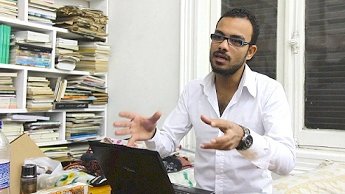When Hosni Mubarak Shut Off Cell Phones and the Internet in January 2011 Was the Moment When More Egyptians than Ever Went Out into the Streets
By the Narco News School of Authentic Journalism
An Oral History of the Egyptian Revolution
October 29, 2012
 This manual-in-progress is for journalists, community organizers and practitioners of civil resistance to help ourselves and each other develop better skills, strategies and tactics. |
It was an experience eerily relevant to the title of this page: The Day the Internet Died. One of the reasons we didn’t panic is that we had already heard the testimony of the Egyptians who speak on this page about their own experience – during the revolution of 2011 – when it was a regime, and not the weather, that shut down the entire Internet and cell phone system throughout the country.
They triumphed in toppling a dictator not just in spite of the attack on their main communications systems, but also, paradoxically, at least in part because of it. If you doubt that, or think it incredible, you’ll probably find their testimonies about their own lived experience very interesting, or at least very challenging to the assumptions of many that technology – and not people – is what makes change happen today.
Since 2000, Narco News has reported about many social movements, community organizing and civil resistance campaigns. Some succeeded in their goals. Others did not. In this work we have found common practices shared by many victorious struggles, and common errors or missteps shared by many that did not succeed.
The sum of lessons learned through reporting thousands of these stories in many lands today becomes the basis for a massive, free, online and multimedia resource that Narco News, with the scholars and professors of our school, have begun preparing for The School of Authentic Journalism’s Manual to Change the World. This page you are reading right now is the very first lesson presented of many to come.
The Manual will feature more pages, like this one, with the testimony of the Egyptians on how they accomplished the first step of their revolution – toppling the dictator – and continue advancing toward the longer-term goal of toppling the dictatorship.
The Manual will also include stories of how civil resistance and organizing battles in other lands were won, and also checklists and “how to” lessons from authentic journalists who reported them to share their skills and experiences so that anyone can learn and apply them – in writing and reporting, video and audio, and use of the Internet – to report on the social movements in the present and the future. With this Manual, we are taking another step forward in making the lessons and curriculum of the School of Authentic Journalism available to the entire world, gratis.
Applications to the April 2013 School of Authentic Journalism are due November 18. Consult this announcement for more information.
Egypt: The Day the Internet Died
In March 2011, just weeks after the Egyptian Revolution brought the fall of the dictator Hosni Mubarak, the Narco News School of Authentic Journalism went to Cairo to interview key participants about their direct lived experience during those historic moments.We asked each of them these questions:
On Friday January 28 the regime turned off the Internet. Did that change your experience of the revolution?
If you are someone who had spent a lot of time online before then, how did you spend those newly free hours during the four or five days that there was no Internet?
And what do you think about claims by some international media that the Egypt resistance was a “Twitter revolution” or “Facebook revolution”?
Did the shut down of the Internet hurt the cause or did it help? Why or why not?
 |
The regime and the Interior Ministry in particular announced that on Friday all communications would be cut off for emergency reasons. That meant that all mobile networks would cease operations: there wouldn’t be any mobile communications. There wouldn’t be Internet. There wouldn’t be anything and of course we wouldn’t be able to communicate.
The regime did not want us to gather together and by turning off the Internet and cell phone systems they thought they would prevent us from reaching each other. They assumed that they would be able to separate us and keep us away from each other and that no one would be able to get to the others and therefore everybody going to the protest would not know where to go. They thought people would go all over the place and they would then be able to arrest them in groups or individually.
 |
Ibrahim Mohammed (26-year-old communications worker, not affiliated with any organization or party): I work in one of the communications companies so of course I found out that the Internet would be cut, SMS services would be cut, the networks would be cut. So I started calling all my friends. That day, I had met people from various parties and movements, and also independent people, so I called them regardless of whichever one they were involved with. I started calling them and saying guys, take care, the internet will be cut at 12 o’clock, SMS services will be cut at 10 p.m. and cell phone networks will be cut at 6 a.m.,so whoever wants to send a message to someone should go ahead and do so. And whoever wants to get to someone or to specify a locations should get to them before this happens.
 |
Mohammed Abbas (youth organizer in January 2011 for the Muslim Brotherhood): Read more>> Narco News: The Day the Internet Died